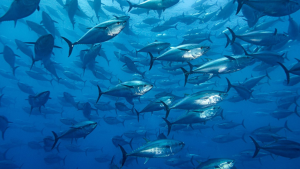A proposal on drifting FADs – used by industrial purse seine fleets, including those of the EU – was put forward by 11 coastal states and was adopted by a two-thirds majority following a vote by secret ballot in the final hours of the three-day meeting in Mombasa, Kenya.
The proposal, which will come into effect on 1 January 2024, included a phased reduction in the number of drifting FADs permitted per vessel, from 300 to 250 in the first year and to 200 in 2025. It also mandated the creation of a drifting FAD registry, allowing for increased transparency and monitoring of the controversial man-made devices used to attract tuna – a large proportion of which are juveniles, impacting the already-overfished yellowfin and bigeye tuna stocks. Most importantly, the adopted proposal put in place a 72-day closure period for drifting FADs. This aspect of the proposal received the most opposition from the EU, who have threatened to object to the proposal in its entirety. Another proposal on anchored FADs, put forward by Maldives and Kenya, was adopted by consensus.
Blue Marine Foundation and the International Pole and Line Foundation (IPNLF) congratulate the IOTC members on the successful measures adopted at the meeting to curb the harmful effects of FADs on tuna stocks, endangered species and the marine environment, and urge all IOTC member states, including the EU, to abide by the conservation measures adopted.
Jess Rattle, Head of Investigations at Blue Marine, said: “This landmark decision has been three years in the making and is a giant step forward for the conservation of tuna stocks in the Indian Ocean. In the face of immense pressure and opposition from powerful actors from the EU, the 11 coastal states and the other supporters of the drifting FAD measure showed true leadership and dedication to protecting the Indian Ocean’s tuna stocks and the countless coastal communities that depend on them”.
Martin Purves, Managing Director of IPNLF, said: “We congratulate the coastal states who worked so hard to secure this important victory for tuna stocks and coastal livelihoods throughout the Indian Ocean region. While acknowledging that significant concessions were made to accommodate small island developing states during the negotiation process, the new measure on harmful drifting FADs will have a significant impact on controlling the damage caused by industrial purse seine tuna fleets”.
IPNLF and Blue Marine hope that the introduction of both conservation measures will help to rebuild overfished stocks, protect ecosystems and safeguard livelihoods of coastal communities.
